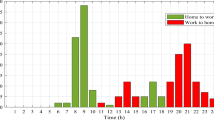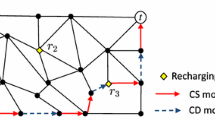Abstract
A novel model for the charging station planning problem of plug-in electric vehicles is proposed in this paper considering the users’ daily travel. With the objective of minimizing the total cost, including the charging stations’ cost (including installing cost and management cost) and the users’ cost (including station access cost and charging cost), the proposed model simultaneously handles the problems where to locate the charging stations and how many chargers to be established in each charging station. Considering that different users may have different perception of station access cost and charging cost, two cases (i.e., homogeneous users and heterogeneous users) are typically investigated. The impacts of different discount rates, operating period of the charging stations, number of electric vehicles and number of charging stations on the location of the charging station are also studied. The simulation results not only show that it is very important to locate the charging stations according to the traveling behavior of users, but also verify the validity of the proposed model.
Similar content being viewed by others
References
Andrews, M., Dogru, M.K., Hobby, J.D., Jin, Y. & Tucci, G.H. (2013). Modeling and optimization for electric vehicle charging infrastructure. In IEEE Innovative Smart Grid Technologies Conference 2013.
Avci, B., Girotra, K. & Netessine, S. (2014). Electric vehicles with a battery switching station: adoption and environmental impact. Management Science, 61(4): 772–794.
Chen, T.D., Kockelman, K.M. & Khan, M. (2013). The electric vehicle charging station location problem: a parking based assignment method for Seattle. Transportation Research Board 92nd Annual Meeting, 340.
Chung, S.H. & Kwon, C. (2015). Multi-period planning for electric car charging station locations: a case of Korean expressways. European Journal of Operational Research, 242(2): 677–687.
Dagdougui, H. (2012). Models, methods and approaches for the planning and design of the future hydrogen supply chain. International Journal of Hydrogen Energy, 37(6): 5318–5327.
Dashora, Y., Barnes, J., Combs, R.P.T., Hilliard, M. & Chinthavali, M. (2010). The PHEV charging infrastructure planning (PCIP) problem. International Journal of Emerging Electric Power System, 11(2).
Dong, J., Liu, C.Z. & Lin Z.H. (2014). Charging infrastructure planning for promoting battery electric vehicles: an activity-based approach using multiday travel data. Transportation Research Part C, 38: 44–55.
Frade, I., Ribeiro, A., Goncalves, G. & Antunes, A.P. (2011). An optimization model for locating electric vehicle charging stations in central urban areas. Transportation Research Record: Journal of the Transportation Research Board, 3582: 1–19..
He, F., Wu, D., Yin, Y.F. & Guan, Y.P. (2013). Optimal deployment of public charging stations for plug-in hybrid electric vehicles. Transportation Research Part B, 47: 87–101.
He, F., Yin, Y. & Lawphongpanich, S. (2014). Network equilibrium models with battery electric vehicles. Transportation Research Part B, 67: 306–319.
He, F., Yin, Y.F. & Zhou, J. (2015). Deploying public charging stations for electric vehicles on urban road networks. Transportation Research Part C, 60: 227–240.
Hiermann, G., Puchinger, J., Ropke, S. & Hartl, R.F. (2016). The electric fleet size and mix vehicle routing problem with time windows and recharging stations. European Journal of Operational Research, 252(3): 995–1018.
Jiang, N., Xie, C., Duthie, J.C. & Waller, S.T. (2014). A network equilibrium analysis on destination, route and parking choices with mixed gasoline and electric vehicular flows. European Journal on Transportation and Logistics, 3(1): 55–92.
Kim, J.G. & Kuby, M. (2012). The deviation-flow refueling location model for optimizing a network of refueling stations. International Journal of Hydrogen Energy, 37(6): 5406–5420.
Kim, J.G. & Kuby, M. (2013). A network transformation heuristic approach for the deviation flow refueling location model. Computer Operations Research, 40 (4): 1122–1131.
Li, Y.Q., Li, L., Yong, J., Yao, Y. & Li, Z. (2011). Layout planning of electrical vehicle charging stations based on genetic algorithm. Electrical Power Systems and Computers, Spring Berlin Heidelberg, 99: 661–668.
Lim, S. & Kuby, M. (2010). Heuristic algorithms for siting alternative-fuel stations using the Flow-Refueling Location Model. European Journal of Operational Research, 204(1): 51–61.
Lin, Z., Ogden, J., Fan, Y. & Chen, C.W. (2008). The fuel-travel-back approach to hydrogen station siting. International Journal of Hydrogen Energy, 33(12): 3096–3101.
Liu J. (2012). Electric vehicle charging infrastructure assignment and power grid impacts assessment in Beijing. Energy Policy, 51: 544–557.
Mak, H.Y., Rong, Y. & Max Shen, Z.J. (2013). Infrastructure planning for electric vehicles with battery swapping. Management Science, 59(7): 1557–1575.
Payam, S.B., Abbas, R.G. & Hosein, K.K. (2014). Optimal fast charging station placing and sizing. Applied Energy, 125: 289–299.
Pelletier, S., Jabali, O. & Laporte, G. (2016). 50th Anniversary invited article-goods distribution with electric vehicles: review and research perspectives. Transportation Science, 50(1): 3–22.
Sathaye, N. & Kelley, S. (2013). An approach for the optimal planning of electric vehicle infrastructure for highway corridors. Transportation Research Part E, 59: 15–33.
Schneider, M., Stenger, A. & Goeke. D. (2014). The electric vehicle routing problem with time windows and recharging stations. Transportation Science, 48 (4): 500–520.
Shahraki, N., Cai, H., Turkay, M. & Xu, M. (2015). Optimal locations of electric public charging stations using real world vehicle travel patterns. Transportation Research Part D, 41: 165–176.
Wang, Y.W. & Lin, C.C. (2013). Locating multiple types of recharging stations for battery-powered electric vehicle transport. Transportation Research Part E, 58: 76–87.
Wang, Z.P., Liu, P., Cui, J., Xi, Y. & Zhang, L. (2013). Research on quantitative models of electric vehicle charging stations based on principle of energy equivalence. Mathematical Problems in Engineering: 1–10.
Xi, X. M., Ramteen, S. & Vincenzo, M. (2013). Simulation-optimization model for location of a public electric vehicle charging infrastructure. Transportation Research Part D, 22: 60–69.
Yildiz, B., Arslan, O. & Karasan, O.E. (2016). A branch and price approach for routing and refueling station location model. European Journal of Operational Research, 248(3): 815–826.
Zhao, J.J. & Ma, T.J. (2016). Optimizing layouts of initial AFV refueling stations targeting different drivers, and experiments with agent-based simulations. European Journal of Operational Research, 249(2): 706–716.
Zhu, Z.H., Gao, Z.Y., Zheng, J.F. & Du, H.M. (2016). Charging station location problem of plug-in electric vehicles. Journal of Transport Geography, 52: 11–22.
Acknowledgments
This work is partly supported by National Basic Research Program of China (2012CB725400), National Natural Science Foundation of China (71501021).
Author information
Authors and Affiliations
Corresponding author
Additional information
Zhihong Zhu is currently a Ph.D. student in Institute of Transportation System Science and Engineering, Beijing Jiaotong University, Beijing, China. She completed master’s degree in Shandong University of Science and Technology, China (2012). Her current research interests include the charging station location problem of EVs and complex system modelling.
Ziyou Gao is a professor in Institute of Transportation System Science and Engineering, Beijing Jiaotong University, Beijing, China. He is one of the important leaders in the RP China Complex Systems Theory and Technology. He has more than 20 years of experience in transportation planning and management. His work has been published in a range of transportation and planning journals, including Operation Research, Transportation Research A: Policy and Practice, Transportation Research B: Methodological, Transportation Research C: Emerging Technology, Transportation Research E: Logistics and Transportation Reviews, etc.
Jianfeng Zheng is a professor in Transportation Management College, Dalian Maritime University, Dalian, Liaoning province, China. During the past years, he has focus on teaching and conducting research in the areas of liner shipping, complex system modelling and logistics location. His work has been published in journals such as Transportation Science, Transportation Research part E: Logistics and Transportation Reviews, European Journal of Operational Research, etc.
Haoming Du is currently a Ph.D. student in Institute of Transportation System Science and Engineering, Beijing Jiaotong University. He completed master’s degree in Shandong University of Science and Technology, China (2012). His research interests include public transportation, traffic system modeling and bus fare optimization.
Rights and permissions
About this article
Cite this article
Zhu, Z., Gao, Z., Zheng, J. et al. Charging Station Planning for Plug-In Electric Vehicles. J. Syst. Sci. Syst. Eng. 27, 24–45 (2018). https://doi.org/10.1007/s11518-017-5352-6
Published:
Issue Date:
DOI: https://doi.org/10.1007/s11518-017-5352-6




